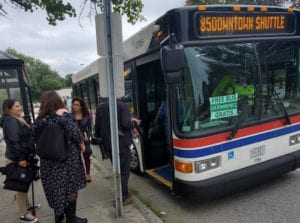Who is a member?
Our members are the local governments of Massachusetts and their elected and appointed leadership.
Mass Innovations, From The Beacon, October 2019

Starting on Sept. 9, the city of Lawrence, in partnership with the Merrimack Valley Regional Transit Authority, made three of its bus routes free to ride for the next two years. (Photo by the Merrimack Valley RTA)
Lawrence residents can now ride buses for free through several city neighborhoods under a new City Hall effort to make public transit more accessible to those who can least afford it.
The city is paying $225,000 to the Merrimack Valley Regional Transit Authority so that Lawrence residents can forgo fares on three bus routes for the next two years. The service, which began on Sept. 9, gives residents greater access to schools, stores, community centers and the hospital, ultimately improving their quality of life, said Mayor Daniel Rivera.
Until now, Rivera said, some residents would walk home with their groceries and make other lengthy trips by foot rather than pay a fare of $1 to $1.25. Having free access to safe, comfortable vehicles will help people get around the city more easily and protect them from the hot and cold weather, he said.
“I think it’s going to improve people’s access and mobility,” Rivera said.
Free rides to medical appointments and grocery stores can lead to better health, he said, and easier access to schools can help improve educational outcomes.
Riders don’t have to present proof of Lawrence residency when they board the buses on routes 34, 37 and 85, Rivera said. With the exception of one route that crosses into Andover, the free rides are contained within city limits. Rivera said the free routes serve areas where the unemployment rate consistently runs at twice the statewide rate.
Rivera said the inspiration for the free routes came from calls by Boston City Councillor Michelle Wu to make the MBTA free for all riders. The Lawrence City Council approved the expenditure as part of the budgeting process over the summer, and the funds are coming out of the city’s roughly $15 million in free cash reserves.
“Every year we have very disciplined spending habits and policies, so our finances are tight,” Rivera said.
Careful spending throughout the year, he said, allows the city to fund specific social programs.
From July 2018 to July 2019, the ridership for the three bus routes was about 93,000, according to Joseph Costanzo, administrator for the Merrimack Valley RTA, which serves 16 communities. The change didn’t pose any logistical challenges for the transit authority, Costanzo said, because the fare boxes already had an extra button that could be programmed to count free riders. He said his agency will track ridership to analyze the effect of the free service.
He said the initial response has been positive. Costanzo said he isn’t aware of any other municipalities paying a regional transit authority to make bus routes free.
Worcester-area policymakers and the public have been examining whether to make the Worcester Regional Transit Authority’s services free for all riders. In May, the independent Worcester Regional Research Bureau released a 12-page report advocating that the transit authority and its 37 member communities consider switching to a fare-free system. The Worcester authority plans to undertake a feasibility study on the idea, said Meaghan Lyver, the authority’s marketing and communications manager.
Some Massachusetts college students are able to ride buses for free due to arrangements their colleges have made with the local transit authority. For example, thousands of college students and employees can ride buses for free on the Pioneer Valley Regional Transit Authority system, and UMass Lowell students and employees can ride local buses for free with their university ID cards.
In Lawrence, though, the question is whether a municipality can boost ridership with fare-free routes. Though the city has made a two-year funding commitment for the three routes, the mayor hopes that demand will extend the investment beyond that period.
“I hope and expect that it will be difficult to roll back,” Rivera said.
For more information, contact Mayor Rivera’s chief of staff, Ana Morales, at 978-620-3014 or AMorales@cityoflawrence.com.